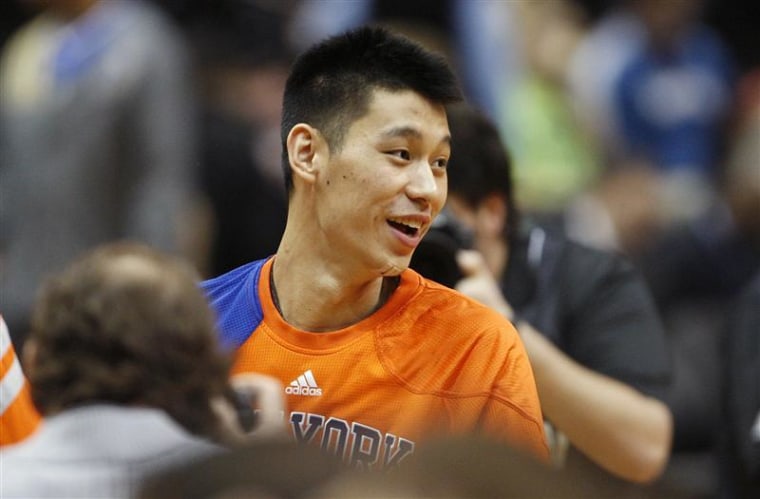As the first ripples of "Linsanity" hit Asia, ethnic Chinese-American Jeremy Lin's fairytale rise has marketing men rubbing their hands with glee as they contemplate a potential candidate to fill the very large shoes left by last year's retirement of Yao Ming.
A clean-cut Harvard graduate rejected by a string of NBA teams, New York Knicks guard Lin has emerged suddenly over the last couple of weeks to inspire a franchise which has underperformed for years in one of the world's biggest sports markets.
That storyline alone would make the 23-year-old Californian an attractive proposition to advertisers, but add in the fact he was born to Taiwanese parents and you would, it seems, have marketing gold on your hands.
"There's no question brands will be interested in Jeremy Lin," Jeremy Walker, head of sports marketing and branded entertainment for GolinHarris, told Reuters by telephone from Hong Kong on Monday.
"You only have to look at what Yao Ming has done not just for the NBA but for brands that he represents both in the States and in China.
"Every top Chinese star that comes out from the Olympic Games or wherever it might be, there's always going to be an awful lot of interest for brands because all the major brands in the world are still looking to China for growth.
"A lot of brands want that positive 'halo effect' association they are going to get from being involved with a superstar."
China has long been the National Basketball Association (NBA)'s biggest market outside North America and the league is the country's most popular sporting import despite the retirement of former Houston Rockets centre Yao.
"Big brother"
Lin's exploits have been witnessed by tens of millions of Chinese fans on state run sportschannel CCTV 5 and, as of Monday, Lin had more than 800,000 fans on his microblogging account.
Yao became one of China's most popular public figures on the back of his exploits as a trailblazer in the NBA, topping the Forbes China celebrity list for six years from its inception in 2004 for both his influence and earnings.
Much of his income - in excess of $50 million for both 2008 and 2009 according to Forbes - came from lucrative deals to promote the likes of Pepsi, Visa, Apple, McDonalds and Reebok as he cashed in on a profile boosted by eight selections to the NBA's All Star game.
Lin, who has described Yao as a "big brother" figure and played in the Shanghai giant's charity game in Taiwan in 2010, has a long way to go to match that kind of NBA success and those kind of earnings.
To do so, he will have to compete with NBA luminaries like Lebron James and Kobe Bryant both on and off the court as top American professionals are now fixtures in Chinese advertising campaigns and frequently visit the country for promotional tours.
Stephon Marbury, himself a former point guard for the Knicks, took his one-man promotional campaign for his "Starbury" athletic shoes straight to the marketplace and has played for two seasons in the Chinese Basketball Association (CBA) league.
Yao is a Shanghai native and was a stalwart of the national basketball team and Lin's parentage might not be enough of a draw for some in the increasingly sophisticated China market.
While they enjoy warm business ties, China claims Taiwan, a U.S. ally, as a renegade province that must be re-unified eventually with the mainland.
"If Yao Ming is China's largest export to the United States then Jeremy Lin is now America's self-produced, self-sold, fully-customized product for the Chinese market," a Chinese netizen posted on Weibo under the name Anakin Skywalker this week.
East Asian credentials
Walker, though, pointed to American golfers Tiger Woods, whose mother is Thai, and Michelle Wie, whose parents are South Korean, as examples of athletes whose Asian roots have garnered them a strong following in the most populous continent.
"Ethnicity can be very, very important," he added. "People like to see one of their own doing very well, no matter where you are from, no matter where you are born."
In Hong Kong, however, some were less than convinced of Lin's star quality. "I think it's because he's Asian (that he's getting so much attention)," said one young basketball player, practicing at Hong Kong's Wanchai Sports Center.
"He's not that special compared to the black players in the U.S."
Hong Kong resident Paul, a keen basketball player in his spare time, said: "I actually don't think it's that impressive. You can't compare to Yao Ming.
"It's only been five games so we don't know if his fame will continue, so you have to wait and see him play more. There's potential, but there's nothing special about him."
While some in China are reluctant to accept Lin's East Asian credentials, Taiwan's sensation-loving media has shown no such reticence and his exploits have shared the front pages of most newspapers.
The coverage, however, has been as much about the reaction to him in the U.S. media rather than about the player himself, as the island basks in the reflected glory of his sudden fame.
"It is awesome that Lin has been added to a list of ace Taiwanese athletes who have contributed to making our days and our weekends in particular," the United Evening News opined in its Sunday edition.
